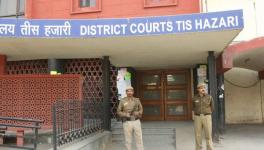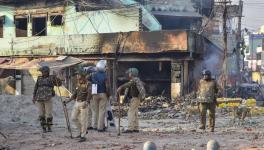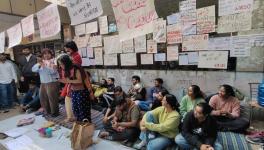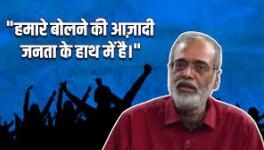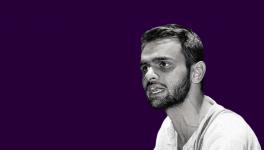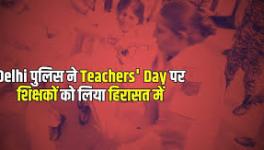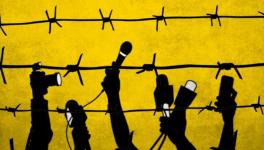Jamia Violence: Booked as ‘Scapegoats’, Court Discharges Sharjeel, Safoora, Tanha & Others
New Delhi: In an indictment of the Delhi Police, a sessions court, while discharging Sharjeel Imam, Asif Iqbal Tanha, Safoora Zargar and eight others in 2019 Jamia violence case, observed that "unable to apprehend actual perpetrators", the police roped in the accused as "scapegoats" in the matter.
“(The) Delhi Police has arbitrarily chosen to array some people from the crowd as accused and others as police witnesses. This cherry picking is detrimental to precept of fairness," said Additional Sessions Judge Arul Varma.
Observing that “mere presence at protest site without overt acts cannot implicate them", Varma pulled up investigators, adding that the prosecution has ex facie been launched in a "perfunctory and cavalier fashion" against the accused persons.
"To allow them to undergo a rigmarole of long drawn trial does not augur well for the criminal justice system of our country," he noted.
The court said such a police action is detrimental to the liberty of citizens who choose to exercise their fundamental right to peacefully assemble and protest.
"Liberty of protesting citizens should not have been lightly interfered with," it observed.
The court underscored that dissent is nothing but an extension of "invaluable fundamental right" to freedom of speech and expression contained in Article 19, subject to the restrictions contained therein.
"It is a right which we are sworn to uphold," said the judge.
ASJ Varma said desideratum is for investigative agencies to discern the difference between dissent and insurrection. The latter has to be quelled indisputably. However, the former has to be given space, a forum, for, dissent is reflective of something which pricks a citizen's conscience.
"This court cannot but arrive at the conclusion that the police were unable to apprehend the actual perpetrators behind commission of the offence, but surely managed to rope the persons herein as scapegoats," he observed.
Coming down heavily on the prosecution for filing "ill-conceived" chargesheet, the court observed, "In the present case, the investigative agencies should have incorporated the use of technology, or have gathered credible intelligence, and then only should have embarked on galvanising the judicial system qua the accused herein. Else, it should have abstained from filing such an ill-conceived chargesheets qua persons whose role was confined only to being a part of a protest."
Those who have been discharged are: Sharjeel Imam, Asif Iqbal Tanha, Safoora Zargar, Mohd Abuzar, Umair Ahmed, Mohd Shoaib, Mahmood Anwar, Mohd Qasim, Mohd Bilal Nadeem, Shahzar Raza Khan and Chanda Yadav.
However, charges have been framed against only one accused, namely, Mohd Ilyas.
Violence had erupted at and near Jamia Millia Islamia in December 2019 after students and local residents, who were protesting against the controversial Citizenship Amendment Act (CAA) and the proposed National Register of Citizen (NRC) and the National Population Register (NPR), were stopped from holding a peaceful March to Rajghat (the memorial of Mahatma Gandhi).
The police had registered a first information report (FIR) under Sections of rioting and unlawful assembly: 143, 147, 148, 149, 186, 308, 323, 332, 333, 341, 353, 427, 435, 120B and 35 of the Indian Penal Code (IPC).
A chargesheet was filed in the case on April 21, 2020 against Ilyas. The police then filed second supplementary chargesheet against the 11 persons whom the court discharged today (February 4).
On February 1 this year, while arguments on charges were going on, a third supplementary chargesheet was filed wherein the prosecution claimed witnesses have identified the accused.
Unconvinced with the arguments, witnesses and evidence brought on record, the judge observed the Delhi Police failed to adduce fresh evidence and rather sought to present "old facts in the grab of further investigation" by filing supplementary chargesheets.
"...it has been most unusual of the police to file one chargesheet and not one but three supplementary chargesheets, with really nothing new to offer," said the judge, adding that the practice of filing multiple chargesheets must cease, "else this juggernaut reflects something beyond mere prosecution and would have effect of trampling the rights of accused".
The court said there were not a single eyewitness who could substantiate the police version that the accused were in any way involved in the commission of the offence.
It noted that no test identification parade was carried out during investigation till filing of the third supplementary chargesheet.
The photographs and the videos only demonstrating that the accused persons standing behind the barricades prompted the court to conclude, "There is nothing on record to even prima facie suggest that the accused herein were part of some riotous mob. None of the accused herein were brandishing any weapon or throwing stones, etc. This prima facie there is no evidence qua the accused herein that they resisted execution of any law. Prosecutions cannot be launched on the basis of conjectures and surmises, and chargesheets definitely cannot be filed on the basis of probabilities."
Get the latest reports & analysis with people's perspective on Protests, movements & deep analytical videos, discussions of the current affairs in your Telegram app. Subscribe to NewsClick's Telegram channel & get Real-Time updates on stories, as they get published on our website.












